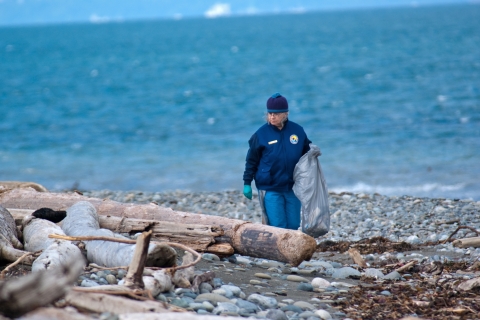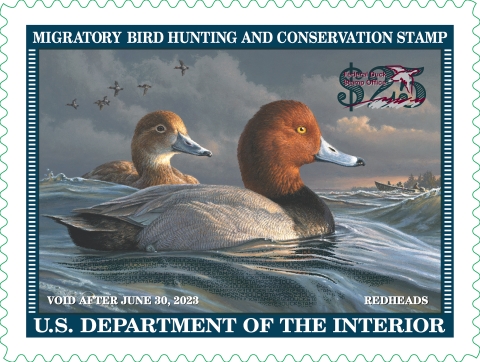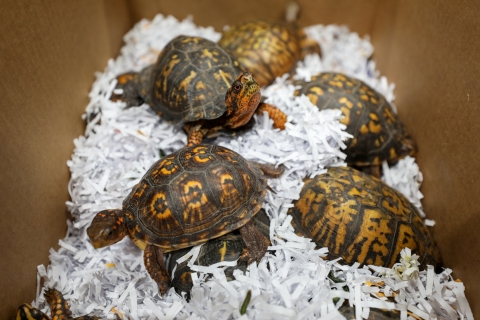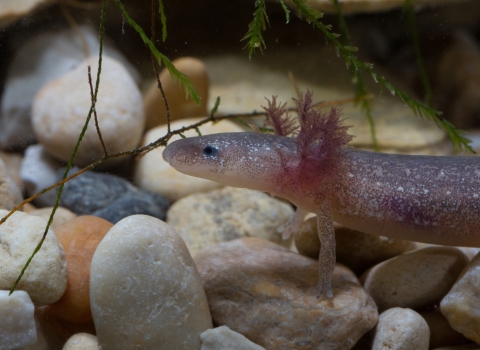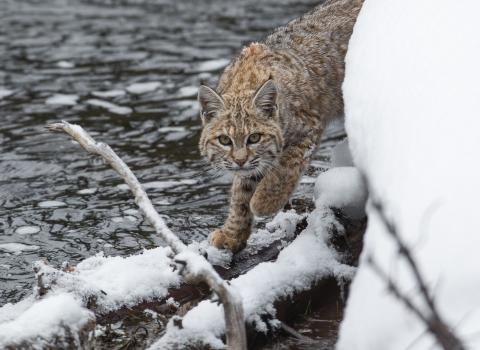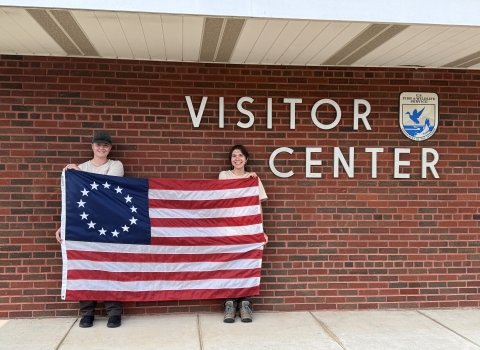December. Last year’s list of New Year’s resolutions is buried beneath the pile of books you didn’t read. You’re having those recurring dreams about sugarplums again. And that reindeer you heard prancing on the roof last night? Actually a squirrel making a nest in your attic.
Sometimes "the most wonderful time of year” can be a little overwhelming. Get ready to feel jolly: We can help you tackle your holiday shopping and get a jumpstart on a happy New Year with our guide to gifts that help support fish, wildlife and their habitats. Plus some gifts to think twice about.
Feel-good gifts for the current and future nature lovers in your life
Perfect for: The armchair ornithologist
If you’re one of the many people who have discovered the joys of birdwatching, you may also have experienced the startling thump of a bird flying into your window. Sadly, these are not isolated incidents. An estimated one billion birds die as a result of window collisions in North America each year, either attracted by lights at night, or by the reflection of sky and trees during the day. Give the bird lover (and birds) in your life the gift of safer windows with bird decals, window film, and timers for lights.
Perfect for: The person you avoid eye contact with in the morning until they’re adequately caffeinated
For many people, coffee isn’t just the best part of waking up: it’s the reason we get out of bed in the morning. Guilty. You can make our mornings even brighter with coffee that supports wildlife habitat. Shade-grown and bird-friendly coffees are produced on farms that provide critical shade-cover habitat for migratory and resident birds in tropical landscapes threatened by deforestation.
Perfect for: Someone with a green thumb and a good appetite
Many agricultural crops, like almonds, apples, and strawberries, rely on help from bees, butterflies, and even bats to transfer pollen between plants for production. But even crops that can self-pollinate, like coffee, get a productivity boost from pollinators. No matter your diet, the global decline in pollinator populations should be cause for heartburn. You can help nurture native pollinators by growing a little habitat in your yard, window box, community garden plot, wherever! Look for regional plant guides that can help you figure what flowering plants will grow where you live, and native wildflower seed mixes that make great stocking stuffers.
Perfect for: The brew-gooder
Your wish came true! You can help save the planet by drinking beer. Breweries around the U.S. are using their craft to support conservation of fish, wildlife, and their habitats by raising awareness and funds. Many have even produced beers to support species at risk. Grab that special someone a six-pack of something that pairs well with conservation. If you have a cocktail enthusiast on your list, look for bat-friendly tequila. Remember, some plants rely on pollinators: Tequila is produced from blue agave, which is pollinated almost exclusively by the lesser long-nosed bat.
Perfect for: Those who want not, because they waste not
Anything that helps reduce, reuse, or recycle waste is a good thing for wildlife. A gift of a composting bin or service keeps food scraps out of landfills, where they take up space and release methane, a greenhouse gas that’s particularly effective at trapping radiation (that’s bad). A gift of reusable straws or travel utensils reduces single-use plastics, keeping them out of oceans, where they are ingested by seabirds, fish, and turtles who mistake them for food. There’s also creative reuse: handbags and jewelry made from recycled plastic, and notebooks made from recycled elephant poop. Seriously.
Perfect for: Devotees of the hygge lifestyle
People who relish winter coziness have a lot in common with hibernating bats, mammals adapted for a long winter’s nap. But during the hibernation period, when bats are living off of energy stores, they are vulnerable to extreme cold, and diseases like White-Nose Syndrome that disturb their sleep. For bats, having a thermally stable hyggekrog – Danish for “cozy nook” – is a matter of life and death. While bats spend their winters cozied up in mines or caves, you can buy or build a bat house to provide them a place to snuggle with their pups in the summer.
Perfect for: Everyone else
A waterfowl hunting permit, an all-access refuge pass, a miniature work of art, a fancy sticker — the Federal Duck Stamp is the perfect gift for anyone on your list. But it's also a gift for conservation. For every dollar spent on Federal Duck Stamps, ninety-eight cents go directly to purchase habitat or acquire conservation easements for protection in the National Wildlife Refuge System. Why settle for six geese a laying when you can support habitat for populations of migratory geese?
Buyer Beware!
Is that acoustic guitar made of Brazilian rosewood? Is that vintage boa made from migratory bird feathers? Is that taxidermized grizzly bear scowling at you?
If you are considering buying any items made from or containing wildlife products, including live animals or plants, you need to do your homework.
Most countries, including the U.S., protect native flora and fauna under both national laws and the Convention on International Trade in Endangered Species of Wild Fauna and Flora (CITES) — an international treaty that regulates trade in order to prevent exploitation.
Here are markets where we urge you to be a cautious consumer this holiday season, and beyond:
Exotic pets
The growing demand for unusual pets like turtles, tropical fish, birds, and lizards has fueled illicit trades, and some wild-caught animals are falsely advertised as captive-bred, including native turtles and tortoises collected illegally in the U.S.
Our recommendation: Because of their specialized care needs, many exotic pets end up in animal shelters. Consider adopting instead of buying. If you decide to purchase, ask for documentation that an animal was traded legally, including permits when applicable.
Unusual plants
Orchids, Venus fly traps, and cacti, have also become targets of the illicit trade because of growing demand. The entire cactus family, including all cacti native to the United States and its territories, is now listed under CITES. That means a permit may be required for export, import, or both.
Our recommendation: Purchase plants that are grown in nurseries to reduce collection pressure on wild populations.
Native American and Alaskan Native arts and handicrafts
The sale of counterfeit Native American and Alaskan Native arts and crafts is a growing problem — it undermines the work of indigenous artists and artisans, deceives consumers, and violates the Indian Arts and Crafts Act of 1990.
Our recommendation: Check the Indian Arts and Crafts Board’s directory of American Indian and Alaska Native Owned and Operated Arts and Crafts Businesses to find legitimate dealers.
Products made from wildlife or plants
Any product made with wildlife or wild plant parts may be subject to state, national, and international import and export laws. Follow the steps outlined on this page to determine if you need a permit for a wildlife and plant products.
Our recommendation: Instead a giving a gift that may harm imperiled species, you can give a gift designed to help them! By purchasing Tiger Stamps from your local U.S. Post Office, you can support conservation projects around the world to help sea turtles, great apes, elephants, rhinos, tigers, and more.



